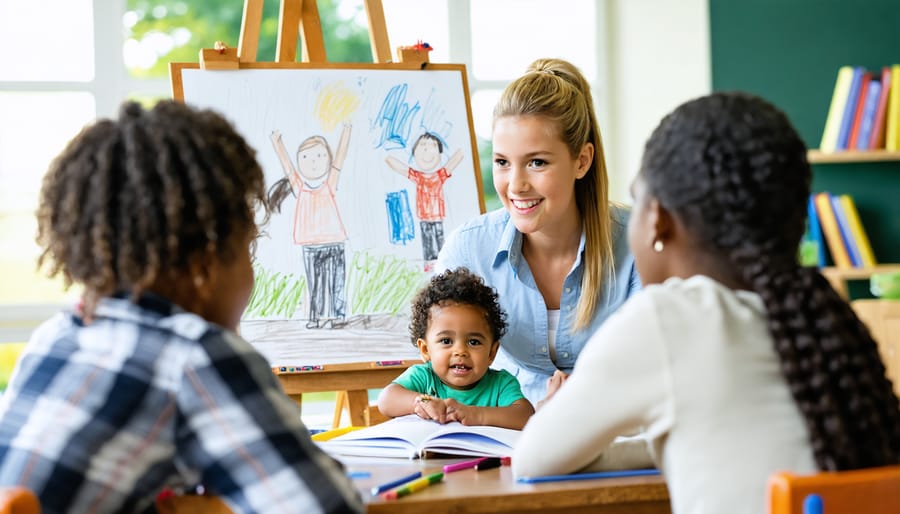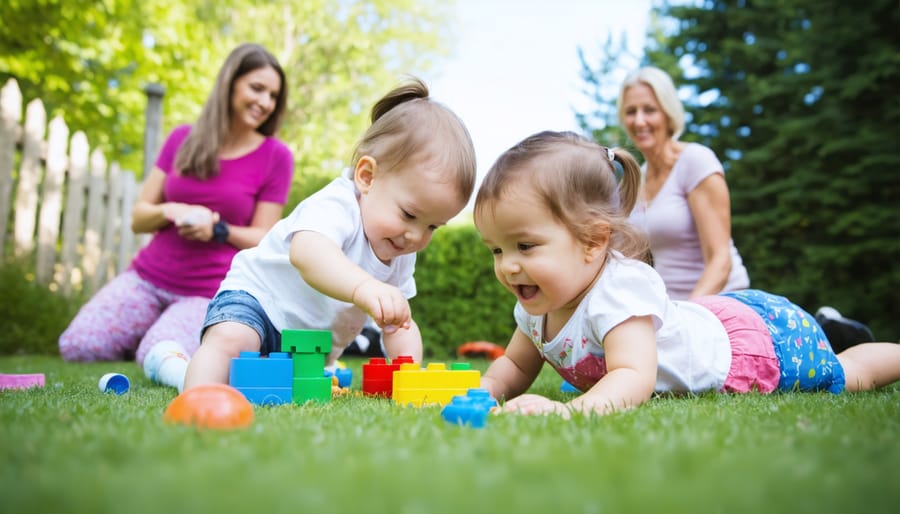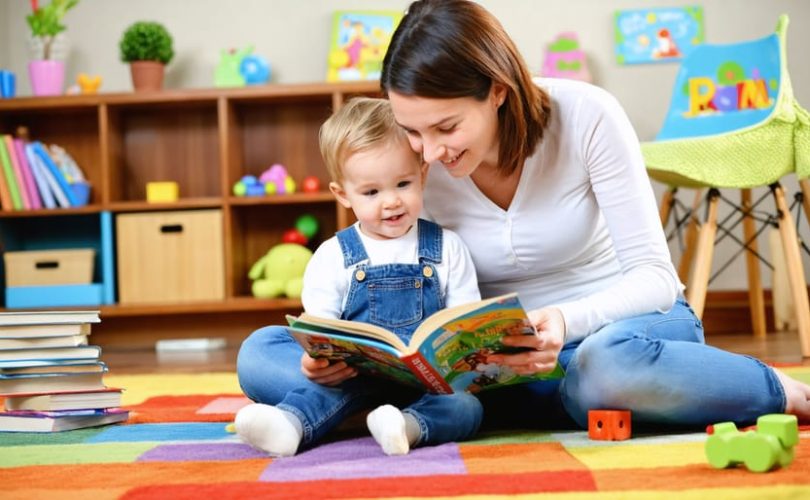When parents actively engage in their child’s early education, they create a powerful foundation for lifelong learning and emotional well-being. Research consistently shows that children with involved parents perform better academically, develop stronger social skills, and maintain higher self-esteem throughout their educational journey. From reading bedtime stories to participating in classroom activities, these early interactions shape not just academic success, but also crucial developmental milestones.
The impact of parental involvement extends far beyond the classroom walls. Studies reveal that children whose parents regularly communicate with teachers and participate in school activities are 40% more likely to develop strong problem-solving skills and emotional resilience. This partnership between home and school creates a supportive environment where children feel secure, valued, and motivated to learn.
As both educators and child development experts emphasize, the first eight years of a child’s life represent a critical window for building the cognitive, social, and emotional skills that will serve them throughout their lives. By actively participating in early childhood education, parents become powerful architects of their children’s future success.
Building Strong Foundations Through Daily Interactions
Quality Time and Communication
When parents dedicate focused time to interact with their children during educational activities, they create powerful opportunities for social and emotional growth. Something as simple as reading a story together or working on a puzzle can become a meaningful moment that builds your child’s confidence and communication skills.
Dr. Sarah Chen, a child development specialist, notes that “children who regularly engage in quality interactions with their parents show greater social competence and self-assurance in school settings.” These positive experiences help children develop the courage to express themselves and interact with others.
Consider setting aside 15-30 minutes each day for uninterrupted, education-focused time with your child. During these moments, practice active listening, ask open-ended questions, and show genuine interest in their thoughts and ideas. This might include discussing their artwork, helping with letter recognition, or exploring numbers through everyday activities like cooking or shopping.
Remember that consistency matters more than duration. Regular, meaningful interactions help children feel valued and supported, creating a strong foundation for their social development and academic journey.

Modeling Social Behaviors
Children learn by watching, and parents serve as their first and most influential social role models. Through effective parenting styles, caregivers can demonstrate positive social behaviors that children naturally absorb and replicate.
When parents actively participate in educational settings, they show children how to interact respectfully with teachers, collaborate with peers, and navigate social situations confidently. Something as simple as greeting other parents at school drop-off or engaging in friendly conversation during school events teaches children valuable lessons about social etiquette and building relationships.
Dr. Sarah Chen, a child development specialist, notes: “Children who see their parents actively engaging in school communities develop stronger social skills and greater emotional intelligence. They learn essential skills like sharing, taking turns, and showing empathy through observation.”
By volunteering in classroom activities or participating in parent-teacher meetings, you’re not just supporting your child’s education – you’re modeling important social skills like active listening, problem-solving, and respectful communication that will benefit them throughout their lives.
Partnering with Teachers for Social Growth

Regular Communication Channels
Establishing regular communication channels with your child’s teachers creates a strong foundation to boost your child’s education. Today’s technology offers multiple ways to stay connected, making it easier than ever to maintain meaningful dialogue with educators.
Consider setting up bi-weekly email check-ins with teachers to discuss your child’s progress and any concerns. Many schools now use parent-teacher communication apps that allow for instant messaging and photo sharing of classroom activities. These tools provide real-time insights into your child’s daily experiences and learning journey.
Traditional methods like parent-teacher conferences remain valuable opportunities for in-depth discussions. Make the most of these meetings by preparing questions beforehand and taking notes. Some teachers also welcome scheduled phone calls or video chats for more personal conversations.
Creating a communication notebook that travels between home and school can be particularly effective for younger children. This simple tool allows both parents and teachers to share daily observations, celebrate small victories, and address any challenges promptly.
Remember to keep communications positive, solution-focused, and regular. When teachers know they can count on your engagement, they’re more likely to reach out proactively with both concerns and achievements.
Supporting School Social Activities
School social activities provide wonderful opportunities for parents to actively participate in their child’s educational journey while building lasting connections within the school community. Whether it’s volunteering at school fairs, helping with class parties, or chaperoning field trips, your presence makes a significant difference in your child’s social development and academic experience.
When parents participate in school events, children feel a sense of pride and belonging. As Maria Thompson, a child development specialist, notes, “Children whose parents are involved in school activities often show increased confidence and better social skills.” This involvement also helps you understand your child’s social circle and observe how they interact with peers and teachers in different settings.
Consider starting small by attending parent-teacher meetings or joining the PTA. As you become more comfortable, you can take on larger roles like organizing cultural celebrations or coordinating classroom activities. Many schools offer various opportunities throughout the year, from book fairs and sports days to holiday celebrations and talent shows.
Remember that your involvement doesn’t always require significant time commitments. Even participating in one or two events per semester can make a meaningful impact on your child’s educational experience and the school community as a whole.
Creating Social Learning Opportunities
Organized Playdates and Activities
Organizing playdates and structured activities provides children with invaluable opportunities to develop social skills while learning through peer interaction. When parents take an active role in arranging these social encounters, they create safe, supportive environments where children can practice important life skills.
Consider starting with small, manageable gatherings of two or three children. This allows you to observe how your child interacts and provide gentle guidance when needed. During these playdates, mix free play with structured activities like arts and crafts, building blocks, or simple cooperative games that encourage sharing and turn-taking.
As Sarah Thompson, a child development specialist, notes, “When parents actively participate in organizing social activities, they’re not just creating fun moments – they’re helping build the foundation for their children’s future social competence.”
Remember to rotate activities between different settings: home, local parks, or community centers. This variety helps children adapt to different social environments while developing flexibility and resilience. You might also consider joining parent-child groups or organizing regular meetups with other families from your child’s preschool.
The key is to maintain a balance between structure and spontaneity. While it’s important to plan activities, allow room for natural interaction and child-led play. This combination helps children develop both social skills and independence while feeling supported by your presence and guidance.

Community Involvement
Community involvement creates valuable opportunities for both parents and children to grow together while strengthening educational outcomes. When families participate in local events, volunteer activities, and educational programs, children develop essential social skills and learn the importance of civic engagement.
Consider joining parent-teacher associations (PTAs) or organizing community reading circles where children can interact with peers while parents connect with other families. Local libraries often host storytelling sessions and educational workshops, providing excellent venues for families to engage in learning activities together.
Sarah Thompson, a preschool teacher with 15 years of experience, shares, “I’ve noticed that children whose parents are actively involved in community activities tend to be more confident and show better social adjustment. They learn to navigate different social situations naturally.”
Participating in community garden projects, local clean-up drives, or cultural festivals can teach children about environmental responsibility, cultural diversity, and teamwork. These activities also help families build strong support networks within their community, which is crucial for both child development and parental well-being.
Consider starting small by attending one community event per month. As your comfort level grows, you can gradually increase participation or even take leadership roles in organizing educational activities. Remember, every small contribution to community involvement helps create a richer learning environment for your child while strengthening family bonds.
Supporting Emotional Intelligence
Parents play a crucial role in developing their child’s emotional intelligence during the early years. By actively participating in their education, parents can help children manage emotions and build strong emotional foundations that last a lifetime.
One effective approach is to create a supportive emotional environment at home that mirrors positive classroom practices. This might include using feeling charts, implementing calm-down corners, or practicing deep breathing exercises together. When parents consistently acknowledge and validate their children’s feelings, they help little ones develop a rich emotional vocabulary and self-awareness.
Dr. Sarah Martinez, a child psychologist, shares: “When parents actively engage in their child’s emotional development, they’re essentially providing a safe space for emotional expression and learning. This partnership between home and school creates a powerful support system for the child.”
Consider starting a feelings journal with your child, where you can draw or write about emotions together. During daily activities like reading stories or playing, take time to discuss characters’ feelings and relate them to your child’s experiences. These simple yet meaningful interactions help children understand their emotions better and develop empathy for others.
Remember, emotional intelligence develops gradually, and your consistent presence and support make a significant difference in your child’s emotional growth journey.
Parental involvement in early childhood education creates a strong foundation for lifelong learning and success. By actively participating in your child’s educational journey, you help build their confidence, improve academic performance, and foster a positive attitude toward learning. Remember that involvement can take many forms – from reading together at home to participating in school activities or simply maintaining open communication with teachers.
To get started, choose one or two activities that fit naturally into your schedule, such as setting aside 15 minutes for daily reading or joining one monthly school event. As you become more comfortable, gradually increase your involvement based on your child’s needs and your availability. The key is consistency rather than quantity.
Your presence and support make a lasting difference in your child’s educational experience. By taking these small but meaningful steps today, you’re investing in your child’s future success and well-being.







